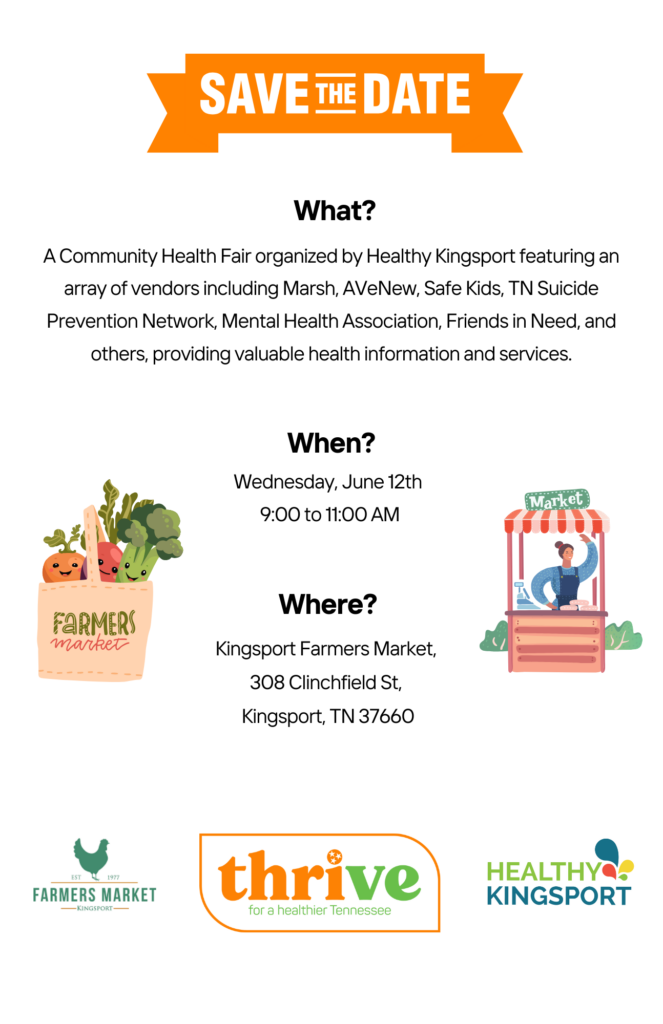What is THRIVE?
Upcoming Events/Programs
THRIVE, which stands for Tennessee Health Resources in Vaccine Education aims to support a healthier Tennessee through vaccine/health education and awareness. By bringing data-based vaccine information to the residents of Sullivan County, THRIVE aims to alleviate fears regarding vaccinations and provide evidence-based information to allow individuals to make informed decisions about their health.
News/Important Information
Since June 2023, the Sullivan County THRIVE program has positively impacted approximately 62,165 individuals by promoting preventative health measures. Our comprehensive approach has included a variety of initiatives, such as program offerings including Chair Yoga, Matter of Balance, Walk with Ease, and Living Well with Chronic Conditions. Additionally, we have provided extensive vaccine education through the Healthy Kids THRIVE Curriculum and supported local vaccine and medical clinics to ensure adequate access to preventative healthcare. Moreover, our efforts have also extended to speaking engagements, social media, and community events, enhancing our outreach and engagement.
As we continue to advance our mission of supporting a healthier Tennessee, I would like to share that I will conclude my role as the Sullivan County THRIVE program assistant on June 14th. Despite this change, the Sullivan County Family and Consumer Science Department remains dedicated to supporting preventative health measures across Sullivan County.
Importance of Immunization
Immunization is crucial for protecting individual and public health. It helps:
- Prevent Disease Outbreaks: By maintaining high vaccination rates, communities can achieve herd immunity, reducing the spread of contagious diseases.
- Protect Vulnerable Populations: Infants, elderly individuals, and those with weakened immune systems rely on herd immunity for protection.
- Reduce Health Care Costs: Preventing diseases through vaccination reduces the need for medical treatments, hospitalizations, and long-term care.
Immunization programs have successfully eradicated or significantly reduced the prevalence of diseases like smallpox, polio, and measles. Maintaining high vaccination coverage is essential to prevent the resurgence of these and other diseases.
Vaccine Schedules and Recommendations
Following the recommended vaccine schedules is crucial for optimal protection:
- Infants and Children: Should receive vaccines according to the CDC’s recommended immunization schedule to protect against diseases like measles, mumps, rubella, polio, and whooping cough.
- Adolescents and Adults: Need booster shots and additional vaccines (e.g., HPV, influenza) to maintain immunity and protect against new threats.
- Special Populations: Pregnant women, travelers, and individuals with certain health conditions may need additional vaccines.
Vaccine schedules are developed based on extensive research to ensure they provide effective protection at the appropriate ages. Adhering to these schedules helps prevent outbreaks and protects community health.
Link to 2024 CDC Vaccine Schedules: https://www.cdc.gov/vaccines/schedules/index.html
For more information concerning vaccinations please follow the provided link: https://www.cdc.gov/vaccines/index.html
*The decision to receive any immunizations should be made after personalized discussions with a healthcare provider.



WCYB News at Noon
THRIVE Introduction and Cold and Flu Season :https://wcyb.com/station/news-5-at-noon/interviews/thrive-program-works-to-promote-health-in-sullivan-county
Measles and Vaccine Awareness: https://wcyb.com/station/news-5-at-noon/interviews/ut-02-02-2024